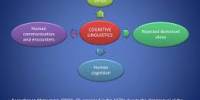Music therapy is a therapeutic technique that uses music to meet physical, emotional, cognitive, and social needs. It is delivered by trained professionals who employ music and its components—such as rhythm, melody, harmony, and lyrics—in therapeutic relationships to improve clients’ quality of life. Music therapy, which is a field of allied health care, “is the clinical and evidence-based use of music interventions to accomplish individualized goals within a therapeutic relationship by a credentialed professional who has completed an approved music therapy program.”
Music therapy is a vast field. Music therapists employ music-based experiences to meet client needs in one or more areas of human functioning, including cognitive, academic, emotional/psychological, behavioral, communicative, social, physiological (sensory, motor, pain, neurological, and other physical systems), spiritual, and aesthetics. It is also a vocation, requires a strong passion for music and a desire to utilize it as a tool to benefit others. Although music therapy was only recently recognized as a profession, the relationship between music and therapy is not new.
Music experiences are purposefully created to use musical aspects such as melody, harmony, key, mode, meter, rhythm, pitch/range, duration, timbre, shape, texture, and instrumentation to achieve therapeutic benefits.
Here are some key aspects and benefits of music therapy:
- Emotional Well-being: Music can evoke emotions and memories, allowing individuals to express themselves in ways they might not be able to with words alone. Music therapy can help individuals manage stress, anxiety, depression, and other emotional issues.
- Physical Health: Music therapy can be used to improve physical health by aiding in pain management, promoting relaxation, and enhancing motor skills and coordination. For example, rhythmic auditory stimulation can help individuals with motor disorders improve their movement.
- Cognitive Function: Music therapy has been shown to enhance cognitive skills such as attention, memory, and problem-solving. It can be particularly beneficial for individuals with neurological conditions such as dementia, Alzheimer’s disease, or traumatic brain injury.
- Social Interaction: Music therapy encourages social interaction and communication. Group music-making activities can foster a sense of belonging and connection among participants, promoting social skills and teamwork.
- Developmental Goals: Music therapy can help children achieve developmental goals like language learning, social skills, and emotional regulation. It can be especially beneficial for children with developmental delays or autism spectrum disorders.
Music therapy can help with personal development and self-awareness by creating a safe environment for exploration and self-expression. It can help people develop coping methods, gain confidence, and boost their self-esteem.
Overall, music therapy provides a comprehensive approach to well-being, addressing the physical, emotional, cognitive, and social dimensions of health. It’s a diverse and effective technique that can work with standard therapy and healthcare.
















